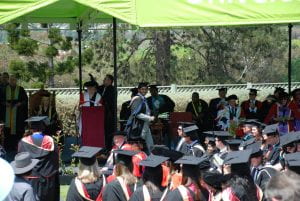Written by Julia Day
 The #UNELaw School is excited to introduce you to Karthi Kanagasabapathy who is the unit coordinator for LAW315 in Trimester Two.
The #UNELaw School is excited to introduce you to Karthi Kanagasabapathy who is the unit coordinator for LAW315 in Trimester Two.
Let’s be honest- securing Karthi as the unit coordinator for LAW315 is a real coup for the law school. Karthi works as a Senior Federal Prosecutor for the Commonwealth Director of Public Prosecutions in Sydney. This means he has first-hand knowledge of the criminal justice system and sentencing in particular.
When I spoke to Karthi about LAW315 I was seriously intrigued. LAW315 starts off by focusing on the philosophies behind criminal sentencing. Essentially there are two main themes which will be explored in the unit. The first relates to the utilitarian view of punishment and the second relates to retributive justice. Put simply utilitarian theories focus on facilitating the greatest happiness of the greatest number of people. Retributive justice on the other hand, more readily relates to ‘an eye for an eye’- if an offender has done wrong in some way they should be made to pay. Karthi notes the theories are either ‘a vengeful type punishment or a “more in sorrow than in anger’ kind of punishment.
When asked which theory seems to be preferred in modern day Australia, Karthi notes ‘the underlying core of our sentencing system is generally retributive justice.’ He goes on to surmise -‘often offenders have mental health or addiction issues. The criminal justice system is ill equipped to deal with these complexities- but it is the only mechanism we have to work with in most cases.’
As you can imagine criminal sentencing is often a political hot button. It is also great fodder for the media. In fact public outcry can lead to reforms in sentencing outcomes. A good example of this is the amendments to the NSW Crimes Act 1900 (NSW) as a result of the one punch attack which led to the death of Thomas Kelly.
When I asked Karthi if he was ever surprised by the results in the criminal cases he prosecutes his answer was intriguing. He stated ’not usually- the general public only get a small snippet of the story in the news cycle- the coverage is usually limited to highlights and the most newsworthy aspects of a case. If the general public had access to all the evidence, it is unlikely they would be surprised by the results in each case.’
Students interested in this unit should also consider our other criminal law electives including Advanced Criminal Law (LAW314), Commonwealth Criminal Law (LAW316), International Criminal Law (LAW391) and Law and Crisis: Use of Emergency Powers (LAW346).
Thank you Karthi for sharing your experience and expertise with #UNELaw students!




